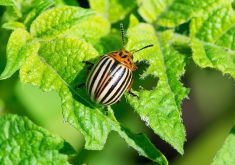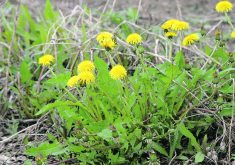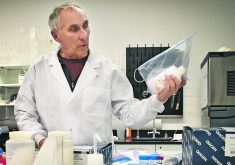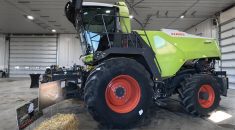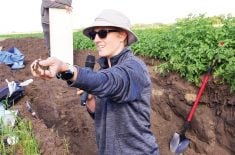Allyl isothiocyanate has been used as pesticide for years, but company says new product more applicable to broad-acre crops
A Saskatchewan-based company uses the same burning sensation you get from a healthy heaping of wasabi or horseradish to fight crop diseases including clubroot and aphanomyces.
All brassica species, including broccoli, cauliflower, cabbage, kale, and mustard produce a chemical called allyl isothiocyanate that causes the burning sensation.
The toxicity of allyl isothiocyanate is low, and it is not considered a human carcinogen.
“We use mustard because it has the highest levels of glucosinolate and the enzyme that we need, but it’s a natural-based product,” said Colin Bletsky of MustGrow Biologics.
Read Also

Soybean market still figuring out implications of China-U.S. pact
Soybean futures had a muted reaction to the U.S. trade deal with China as the market tries to figure out the nuances of the deal.
“It’s a very robust technology. Every time you have sushi or horseradish think about MustGrow when your nose is burning. That’s the same thing we’re putting in the soil that’s killing off the disease and insects and nematodes.”
Allyl isothiocyanate has been used in a variety of products for decades, and it’s not possible to patent the active ingredient.
However, Bletsky said MustGrow has 61 provisional or granted patents on how the company uses Allyl isothiocyanate in its products.
MustGrow already has a product on the market called CannaPM, which is sold as a biological fungicide for cannabis, hemp, and fruit and vegetables.
However, a recent innovation by the company has made its new formulation, called TerraMG, be more applicable for broad-acre crop production.
“It’s a difference of putting 2,000 pounds an acre of our granule product that’s used in fruit and vegetables, to now we’re putting roughly … two to 10 liters an acre,” Bletsky said.
“For the most part everything is moving to our new liquid solution, which has a better impact and more financially favourable terms for farmers.”
TerraMG was developed to target a broad spectrum of plant diseases and pests for broadacre crops and it also has some control on weeds with pre-plant applications.
However, Bletsky said the company has focused on clubroot and aphanomyces because there are few management options to address these diseases.
He said TerraMG has shown promising results in greenhouse conditions, and that the technology came out of an Agriculture Canada research program that looked for uses of mustard that’s not being used for food.
“We’ve actually shown this working with Discovery Labs, that we can have a major impact at the right rates, and even up to almost a 99 percent control of both clubroot and aphanomyces,” Bletsky said.
He said laboratory and greenhouse work must be taken with a grain of salt, and that MustGrow is now making moves to understand how TerraMG can be applied to address specific use cases in real-world conditions.
For instance, TerraMG will be applied with a sprayer or dribbled on and then possibly incorporated into soils, and MustGrow must find out the optimal production practice including timing to impact clubroot spores and aphanomyces zoospores that live within the soil.
MustGrow is also going through the process of getting TerraMG registered in Canada.
“The biggest thing around if you file for fertility or bio stimulation versus bio control, is that what we are trying to show is control. When you do that then it brings you into more of a stringent review, even though it’s a natural product,” Bletsky said.
During the Ag In Motion farm show held July 19-21 near Langham, Sask., MustGrow announced it reached a marketing and distribution agreement in the Canadian canola and pulse market for TerraMG with NexusBioAg, a division of Univar Solutions.
Daniel Samphir of NexusBioAg said TerraMG has a good fit with the company’s line up of crop nutrition solutions, including inoculants, micronutrients, nitrogen stabilizers, and foliar products.
NexusBioAg uses its BioAdvantage Trials Program to gather data from large-scale field trials to demonstrate the efficacy and value of existing products and products in the pipeline.
“When the timing is right for the product to enter into the BioAdvantage Trials Program, we know that we can accelerate that go-to-market approach and engage growers,” Samphir said.
“We’ve had success in the last couple years and have taken products from having zero coverage on acres to over 600,000 acres in about an 18-month period.”




